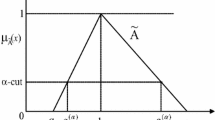Abstract
The purpose of this paper is to present a methodology for analyzing the system performance of an industrial system by utilizing uncertain data. Although there have been tremendous advances in the art and science of system evaluation, yet it is very difficult to assess their performance with a very high accuracy or precision. For handling of these uncertainties, fuzzy set theory has been used in the analysis while their corresponding membership functions are generated by solving a nonlinear optimization problem with particle swarm optimization. For finding the critical component of the system which affects the system performance mostly, a composite measure of reliability, availability and maintainability (RAM) named as the RAM-index has been introduced which influences the effects of failure and repair rate parameters on its performance. A time varying failure and repair rate parameters are used in the analysis instead of constant rate models. Finally, the computed results are finally compared with existing methodologies. The suggested framework has been illustrated with the help of a case.




Similar content being viewed by others
References
C. Ebeling, An introduction to reliability and maintainability engineering, Tata McGraw-Hill Company Ltd., New York (2001).
H. Garg, M. Rani and S.P. Sharma, Fuzzy RAM analysis of the screening unit in a paper industry by utilizing uncertain data, Int. J. Qual. Stat. Reliab., 2012 (2012) 203842.
H. Garg and S.P. Sharma, A two-phase approach for reliability and maintainability analysis of an industrial system, Int. J. Reliab. Qual. Saf. Eng., 19(3) (2012) 1250013.
J. Knezevic and E.R. Odoom, Reliability modeling of repairable systems using Petri nets and fuzzy lambda–tau methodology, Reliab. Eng. Syst. Saf., 73(1) (2001) 1–17.
H. Garg, Reliability analysis of repairable systems using Petri nets and vague lambda–tau methodology, ISA Trans., 52(1) (2013) 6–18.
H. Garg and S.P. Sharma, Stochastic behavior analysis of industrial systems utilizing uncertain data, ISA Trans., 51(6) (2012) 752–762.
H. Garg, S.P. Sharma and M. Rani, Stochastic behavior analysis of an industrial systems using PSOBLT technique, Int. J. Uncertain. Fuzziness Knowl.-Based Syst., 20(05) (2012) 741–761.
Komal, S.P. Sharma and D. Kumar, RAM analysis of repairable industrial systems utilizing uncertain data, Appl. Soft Comput., 10 (2010) 1208–1221.
R.K. Sharma and S. Kumar, Performance modeling in critical engineering systems using RAM analysis, Reliab. Eng. Syst. Saf., 93(6) (2008) 913–919.
P.S. Rajpal, K.S. Shishodia and G.S. Sekhon, An artificial neural network for modeling reliability, availability and maintainability of a repairable system, Reliab. Eng. Syst. Saf., 91(7) (2006) 809–819.
K.Y. Cai, Fuzzy reliability theories, Fuzzy Sets Syst., 40 (1991) 510–511.
A. Kaufmann and M.M. Gupta, Introduction to fuzzy arithmatic: theory and applications, Van Nostrand, New York (1985).
A.K. Verma, A. Srividya, and R.S.P. Gaonkar, Fuzzy reliability engineering: concepts and applications, Narosa Publishing House Pvt. Ltd., New Delhi (2007).
H.J. Zimmermann, Fuzzy set theory and its applications, Kluwer Academic Publishers, Boston (2001).
L.A. Zadeh, Fuzzy sets, Inf. Control, 8 (1965) 338–353.
L.A. Zadeh, The concept of a linguistic variable and its application to approximate reasoning: part-2. Inf. Sci., 8 (1975) 301–357.
A. Birolini, Reliability engineering: theory and practice 5th edition, Springer, New York (2007).
R.E. Barlow and F. Proschan, Statistical theory of reliability, Holt, Rinehart and Winston, New York (1965).
B.S. Dhillion and C. Singh, Engineering reliability: new techniques and applications, Wiley, New York (1991).
J. Kennedy and R.C. Eberhart, Particle swarm optimization. In: IEEE international conference on neural networks, vol. IV, Piscataway (1995) pp. 1942–1948.
Y. Shi and R.C. Eberhart, Parameter selection in particle swarm optimization evolutionary programming VII. In: EP 98, Springer, New York (1998) pp. 591–600.
L.S. Coelho, An efficient particle swarm approach for mixed-integer programming in reliability redundancy optimization applications, Reliab. Eng. Syst. Saf., 94(4) (2009) 830–837.
H. Garg, Fuzzy multiobjective reliability optimization problem of industrial systems using particle swarm optimization, J. Ind. Math., 2013 (2013) 872450.
H. Garg and S.P. Sharma, Multi-objective optimization of crystallization unit in a fertilizer plant using particle swarm optimization, Int. J. Appl. Sci. Eng., 9(4) (2011) 261–276.
W.C. Yeh, Y.C. Lin, Y.Y. Chung and M. Chih, A particle swarm optimization approach based on monte carlo simulation for solving the complex network reliability problem, IEEE Trans. Reliab., 59(1) (2010) 212–221.
H. Garg and S.P. Sharma, Multi-objective reliability-redundancy allocation problem using particle swarm optimization, Comput. Ind. Eng., 64(1) (2013) 247–255.
T.J. Ross, Fuzzy logic with engineering applications, 2nd edition, Wiley, New York (2004).
R. Eberhart and J. Kennedy, A new optimizer using particle swarm theory. In: Proceedings of the sixth international symposium on micro machine and human science, (1995) pp. 39–43.
M. Clerc and J.F. Kennedy, The particle swarm: explosion, stability, and convergence in a multi-dimensional complex space, IEEE Trans. Evol. Comput., 6(1) (2002) 58–73.
Author information
Authors and Affiliations
Corresponding author
Rights and permissions
About this article
Cite this article
Garg, H. Reliability, Availability and Maintainability Analysis of Industrial Systems Using PSO and Fuzzy Methodology. MAPAN 29, 115–129 (2014). https://doi.org/10.1007/s12647-013-0081-x
Received:
Accepted:
Published:
Issue Date:
DOI: https://doi.org/10.1007/s12647-013-0081-x




